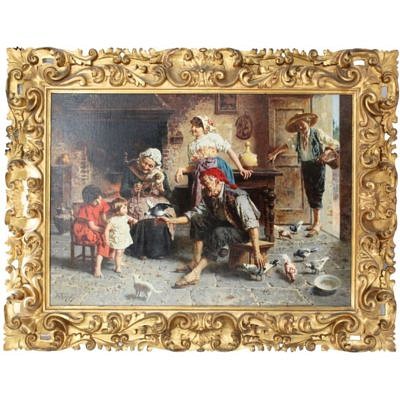Attr. Matteo Sandona (1881-1964), Drypoint Etching
About Seller
522 South Pineapple Avenue
Sarasota, FL 34236
United States
Sarasota Estate Auction specializes in a wide variety of furniture, antiques, fine art, lighting, sculptures, and collectibles. Andrew Ford, owner and operator of the company, has a passion for finding the best pieces of art and antiques and sharing those finds with the Gulf Coast of Florida.
Two ways to bid:
- Leave a max absentee bid and the platform will bid on your behalf up to your maximum bid during the live auction.
- Bid live during the auction and your bids will be submitted real-time to the auctioneer.
Bid Increments
| Price | Bid Increment |
|---|---|
| $0 | $10 |
| $100 | $25 |
| $250 | $50 |
| $1,000 | $100 |
| $2,500 | $250 |
| $7,500 | $500 |
| $20,000 | $1,000 |
| $50,000 | $2,500 |
| $100,000 | $5,000 |
| $250,000 | $10,000 |
About Auction
Nov 5, 2023
Featuring art from artists including Eugenio Zampighi, Edward Moran, Eric Sloane, Francisco Zuniga, Isaac Israels, and others. Also including a Lifetime Collection of Rose Mandarin Porcelain, an Important Persian Serapi Palace Oriental Rug, a Hand Painted Picasso Pitcher, and so much more. Sarasota Estate Auction sarasotaestateauction@gmail.com
- Lot Description
Attr. Matteo Sandona (1881-1964), Drypoint Etching Depicting a group of women dancing in flowing dresses. Overall Size: 19 1/4 x 23 1/4 in. Sight Size: 8 1/8 x 12 1/8 in. #1046 Matteo Sandona, a California portrait, still life and figure painter and etcher, was primarily known for his portraiture. He was born in Schio, Italy, in 1883 and was raised in the Alps. As a child he showed talent in drawing and modeling, and his parents encouraged his creative desire. Seeing the potential of his son, Francesco Sandona moved to the United States in 1891 to pave the way for a better life for his family. He later sent for his family, and settled by 1894, the children began parochial school attendance at the Sacred Heart Academy. Young Matteo Sandona's teachers soon recognized his artistic skill, and at the age of twelve, he was chosen to teach art to his classmates. Realizing after two years in New Jersey a missed opportunity for his son to study in the great art schools of Venice and Verona, Mr. Sandona sent Matteo back to Italy to study with masters. In Verona, Matteo studied for four years at the Verona Academy and in Paris under Napolean Nami and Moses Bianci. He returned to his family living in Hoboken, New Jersey, and then took further training at the National Academy of Design. In 1901, he and his father settled in San Francisco, California, a climate that was much better for Matteo's father, who suffered from rheumatism. That same year, reacting against the conservatism of the San Francisco Art Association, Sandona co-founded the California Society of Artists with Gottardo Piazzoni, Xavier Martinez, Charles Peter Neilson and William Bull. In San Francisco a man by the name of Piero Rossi agreed to pay Matteo Sandona a salary and give him a studio in return for all of the artwork he produced, and this arrangement was helpful in Sandona's establishment as a portrait painter. Eventually portrait commissions led him to travel including to Hawaii and Santa Barbara. He opened his own studio and exhibited at the Mark Hopkins Institute of Art in 1902 and 1903, and frequently showed at the Bohemian Club in San Francisco. After losing his studio on Clay Street in the 1906 earthquake and fire, he rebuilt the home at 471 Buena Vista East, and he designed and decorated it to resemble an Italian villa. He placed his studio at the front of the structure with a view of the bay. There were four floors behind a Queen Ann façade with a double level studio facing east and south that was his studio. The living quarters were on the lower two floors. In 1922 the home was remodeled again. The Original façade was removed and a studio was built at the front of the building, facing north. The new studio was designed to resemble an Italian villa with Italianate relief accenting the front of the structure. Matteo named his home Villa il Cipresso. After losing his studio in the 1906 earthquake and fire, Matteo traveled to Europe with his parents, leaving them in Italy while he went to Paris to study. After he spent a year in Paris they returned to California. Sandona himself moved to Santa Barbara in 1911 and married in 1913 to Gertrude Unger. He exhibited in many one-man exhibitions between 1919 and 1923. Memberships included the San Francisco Art Association, Carmel Art Association and the Bohemian Club, where he was listed in the 'List of 50'. Matteo continued to live at Villa il Cipresso painting in his studio until his death in 1964. Among those portraits he painted were actresses Olivia DeHaviland and Mary Pickford, and soprano Dame Nelie Melba. Source: Edan Hughes, "Artists in California, 1786-1940" Location BOX 9
- Shipping Info
-
SHIPPING INFORMATION·
Sarasota Estate Auction IS NOT RESPONSIBLE FOR SHIPPING. All shipping will be handled by the winning bidder. Sarasota Estate Auction recommends obtaining shipping quotes before bidding on any items in our auctions. If you are interested in obtaining any information on local shippers, please send us an email and we will kindly send you a list of local shippers. Refunds are not offered under any circumstances base on shipping issues, this is up to the buyer to arrange this beforehand.
Premier Shipping, info@premiershipment.com
-
- Payment & Auction Policies
-
Available payment options
We accept all major credit cards, wire transfers, money orders, checks and PayPal. Please give us a call at (941) 359-8700 or email us at SarasotaEstateAuction@gmail.com to take care of your payments.
-
- Buyer's Premium



 EUR
EUR CAD
CAD AUD
AUD GBP
GBP MXN
MXN HKD
HKD CNY
CNY MYR
MYR SEK
SEK SGD
SGD CHF
CHF THB
THB






















